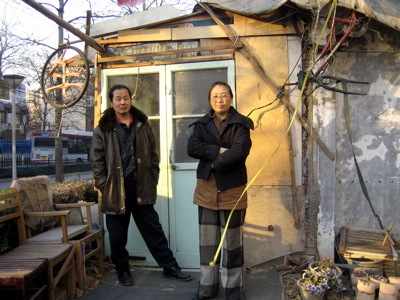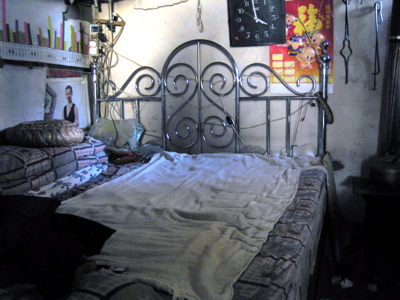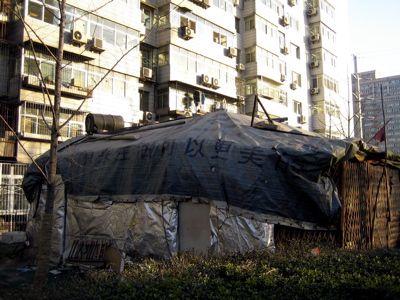As news rages about the “nail house” in Chongqing, where homeowners have become a national sensation by standing their ground against threats to demolish their home, Japhet Weeks presents a portrait of a family in Beijing who has been facing a similar, if less sensational, situation for almost a decade.
====
Is there life after demolition?
by Japhet Weeks
A bittersweet birthday
“The living room was too narrow for a regular TV,” Li Pei says, pointing proudly to the new flatscreen television that hangs on the wall in his recently-renovated high-rise apartment.
We are gathered on a bright-red L-shaped sofa to celebrate the birthday of Li Pei’s middle-aged mother, Hu Jing. Mrs. Hu’s husband, Li Decheng, is busy manning the kitchen stove. Mrs. Hu, with a wide grin on her face, brings dish after dish to the Ikea-knock-off coffee table. Li Pei, 25, who graduated from the China Central Radio and Television University and now works as a cameraman at China Central Television (CCTV) is taking pictures of the gathering on a hi-tech digital camera. Li Pei dreams of one day starting his own film production company.

A scene like this one hardly seems out of place in today’s China, where President Hu Jintao has announced himself as the harbinger of a new harmonious society in which rapid economic growth and openness to western ideas seem to have seamlessly replaced Mao Zedong’s ideology of the past. But as much as the Li’s appear to be beneficiaries of China’s latest economic reforms, they are actually unwitting victims of it, having fallen through the cracks in a chimerical system which promises free market conditions but cannot always deliver. In 1998, the medium-sized repair shop into which Mr. Li and his wife had invested their life savings was demolished by the city government to make way for a small park, and they received no compensation for their loss.
After the birthday celebration wraps up, Mr. Li and Mrs. Hu will bike back to the 20 sq m storefront which is all that remains of their home and once thriving repair shop not far from central Beijing. The city supplies them with neither running water nor electricity, and yet they still stubbornly consider this patch of crumbling brick and concrete to be ‘home’ and continue to wait, perhaps in vain, for a resolution they hope to see before the 2008 Beijing Olympic Games.

Another long march: thirty years of change in China
Li Decheng and Hu Jing’s house looks like a shack next to the middle-class high-rise apartments that loom just to the north. Its outer-walls are a disjointed collage of found objects: thick plastic tarp, different-sized panes of glass, wooden lattice and rope. A tattered Chinese flag flies above the front door. In winter, the vegetable garden at the front of the house is a thicket of desiccated vines. And even though it is almost freezing outside, there are still clothes hanging out to dry on the line. One day I notice a T-shirt of Mr. Li’s flapping in the wind with “CCTV” written in big letters. Mr. Li now repairs equipment for China Central Television, the central government’s national station; his job is without contract and offers no pension.
A skein of thick smoke rises from the back of the house. Mr. Li and his wife rely on a coal-burning stove for heat in the winter. They are forced to steal electricity from the nearby street lamps, which only turn on after dusk, because the city has refused to connect them to the grid. The other day when I visited Mrs. Hu, she had not lit the stove all day and the house was frigid inside. We sat together talking in their dimly lit bedroom. Their drinking water comes from an irrigation spout Mr. Li rerouted. According to a March, 2004 regulation of the Ministry of Construction, demolition firms cannot legally shut off residents’ electricity and water in order to force them out. The living conditions in the house are so untenable that officials have assumed the family will eventually leave of its own free will. But Mr. Li, whose first name, Decheng, can be translated as virtuous city, and Mrs. Hu, whose full name is a yin and yang marriage of the characters for wild and peaceful, have no plans to go anywhere.
Mrs. Hu has a round face with energetic eyes that stare out from behind metal-rimmed glasses, and she always keeps her jet-black hair tied up in a bun. She is extremely talkative, so it doesn’t take much to get her going about the demolition. She once told me that people in her situation, more than anything else, just need someone who is willing to listen. Mr. Li on the other hand is quiet and aloof. His thinning hair is tied back in a ponytail, which he will cut off only when their problem is resolved. His eyes, often partially hidden from view behind his prominent eyelids, are much sadder looking than Mrs. Hu’s. In a recent interview of the couple by a Chinese internet-based TV station, Mrs. Hu vituperated the government for its handling of her family’s situation while the reserved Mr. Li sat in the background looking on.
The complexities of their story closely mirror the vagaries of China’s past three decades of cultural and economic upheaval.
During the Great Proletarian Cultural Revolution, Li Decheng and Hu Jing, upon graduating from high school, set off enthusiastically for the countryside. Once classmates in Beijing, the two were sent about 80km outside of the capital to the same small village in the Huairou district for two years. They eventually married and China, a short while later, made an about-face when it wed itself to the newfangled idea of socialism with Chinese characteristics. The young bright-eyed high school students who earlier had heeded the call for rural re-education, were now, as newlyweds, being asked to develop China’s market economy.
In the 1980s Mr. Li’s work unit was the Dongcheng District Repair Company and he was in charge of a 170 square meter repair shop and surplus store in the capital’s northeastern Dongcheng district. In 1988 his work unit offered to sell him the store for about 7,000 RMB. At that time Mr. Li and his wife’s combined monthly salaries totaled around 70 RMB. The investment was a risk since the economy was only just defining itself as being free market, but there was no reason to be too wary of the deal since the contract of sale was government-approved.
But in 1998, the unimaginable occurred. Members of the Dongcheng Planning Committee arrived one day and told Mr. Li and his wife that their shop, which doubled as their home, was going to be demolished and that a park was to be built in its place. They offered the family no compensation and told them to take their complaints to the Dongcheng District Repair Company. When they did so, with their deed in hand, Mr. Li’s former work unit told him that the decision was not theirs but rather that of the district’s planning committee. Just a half month later, the 170 square meter shop was demolished to a 20 square meter storefront. Mr. Li and his wife were left with an uninhabitable domicile, with neither access to water nor electricity. In addition, they hadn’t been given the chance to clear out their store, and as a result their teenage son lost most of his schoolbooks and they lost much of their inventory.
Mrs. Hu remembers taking Li Pei to school the next day where she had to explain to his teachers how he had lost his class materials. “‘The teacher didn’t believe me,” she said. “‘Those times have passed,’ she told me. I told her to come by and see for herself.”
Up until the recent passage of a milestone private property law at this year’s session of the National People’s Congress, Chinese citizens did not enjoy legal protections for private property. As a result, in the process of transformation to a market economy, reclamation of housing by government and private developers has resulted in the forced eviction of millions of people. Although the new law is in part geared towards satisfying urban middle-class homeowners who will have their current 70-year leases to their property extended forever, it also serves the government’s interests by protecting against the loss of state-owned assets. But critics of the new law have noted that it does nothing to distinguish between property acquired legally versus through corruption. It is therefore unclear whether or not this move to create a more genuine market economy will help Mr. Li and his wife, whose property was stolen from them over a decade ago.
Moreover, according to Mike Meyer, an American who is writing a book on hutong demolition in Beijing, “courts are not allowed to take on chaiqian [demolition] cases, end of story.” This means that even though Mr. Li and his wife legally purchased their business, since it was subsequently demolished, they have no legal recourse for getting it back.
What happens to a dream deferred?
After the ’98 demolition, the Dongcheng District Planning Committee didn’t turn the piece of land into a small community park as planned. Instead, they built a row of ten small storefronts which were rented out until 2004, at which point they were demolished one after another. During those six years, Mr. Li and his wife lived in their 20 square meter storefront – the only storefront in the strip without water and electricity – in constant fear of losing what little they had left. By the middle of 2004, their storefront was the only one still standing and they were literally waiting for the inevitable to happen.
At the beginning of the national May holiday in 2004, city authorities visited Mr. Li and his wife with a wrecking crew. They had come to finish the job they started in 1998. But Li Decheng, Hu Jing, her mother, a septuagenarian, and Li Pei refused to leave the house when they were told to do so. Nonetheless, city authorities ordered the demolition to begin, but because a crowd had gathered outside in protest, the authorities had no choice but to eventually give up their efforts and leave.
According to Mrs. Hu, the female officer in charge of the demolition lied to the crowd that Mr. Li and his family had already been offered a three-room high-rise apartment and 500,000 RMB in compensation, and yet they still refused to leave the 20 sq meter storefront.
The most difficult years for Mr. Li and his family have passed. Between 1998 and 2004, someone always had to be at home just in case officials came to demolish the storefront. Now that Mr. Li and his wife have found an apartment for their son, which they lease from Mrs. Hu’s older brother, their situation seems a little less desperate. At least, Mrs. Hu’s mother, who is a diabetic, has a warm place to live in the winter. Now, on many occasions, Mrs. Hu leaves the house during the day when Mr. Li goes off to the television station for work. But, with the loss of their business, Mrs. Hu and her husband have no pension. They will therefore have to depend on their son for support one day in the not-too-distant future. Mrs. Hu doesn’t want to impose on Li Pei who has enough trouble supporting himself and his girlfriend, but their present situation leaves them with no choice.
In a 2006 open letter to the central government, Mr. Li explained his predicament and asked for a speedy resolution to the problem. He has yet to hear back from anyone. In the letter he stated that he and his wife have faith that the government will do the right thing in the end. But they are not na√Øve by any stretch. Mrs. Hu has said on repeated occasions, when asked why they don’t turn to the courts for help, that the Chinese justice system was designed by people with power to protect people with power. “If the government doesn’t compensate us and I don’t die in the next demolition,” Mrs. Hu said, “I will go to the gates of Zhongnanhai (China’s central government compound) and protest in person.” Before, when they were the owners of a successful small business, they had everything to lose; now, there is nothing left.
In an effort to weatherproof their home, Mr. Li has draped a large plastic tarp, which was previously used to advertise another store, over the roof. It is strapped on with rubber chord and weighted down with cinderblock and rusted pipe. Written on it in faded Chinese characters is a phrase that not only reminds Mr. Li and his wife of everything they’ve been through, but also serves as an emblem of protest for observant passersby: “Before, life was beautiful.”

Japhet Weeks is an editor and freelance writer in Shanghai.






